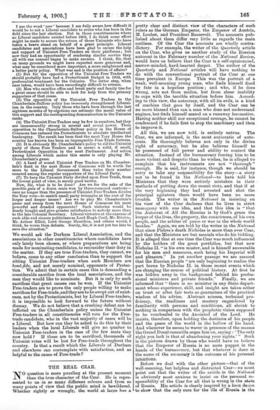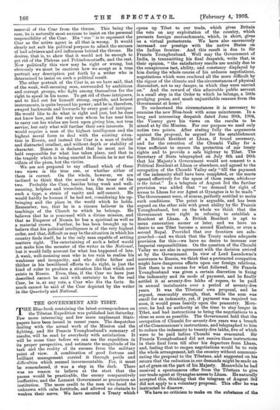N O question is more puzzling at the present moment than
the true character of the Czar. He is repre- sented to us• in so many different colours and from so many points of view that the public mind is bewildered. Whether rightly or wrongly, the world at large has a pretty clear and distinct view of the characters of such rulers as the German Emperor, the Emperor of Austria, M. Loubet, and President Roosevelt. The accounts pub- lished about them differ very little as regards the main outlines. Of the Czar the accounts are wholly contra- dictory. For example, the writer of the Quarterly article on the Czar, who gives us another study of the Russian autocrat in the February number of the National Review, would have us believe that the Czar is a self-opinionated, narrow-minded, hard-hearted despot. The author of the Quarterly and National articles will have nothing to do with the conventional portrait of the Czar at one time prevalent in Europe. This was the portrait of a weak, well-moaning young man, who finds himself fixed by fate in a hopeless position ; and who, if he does wrong, acts not from malice, but from sheer inability to cope with the terrible situation before him. Accord- ing to this view, the autocracy, with all its evils, is a kind of machine that goes by itself, and the Czar can be no more blamed than can a man who does not understand . engines, but finds himself seated on a runaway locomotive. Having neither skill nor exceptional courage, he cannot be condemned if he fails first to stop the machinery and then to improve it.
All this, we are now told, is entirely untrue. The Czar, we are informed, is the most autocratic of auto- crats. He thoroughly believes not only in the divine right of autocracy, but he also believes himself to be possessed of full power and ability to control the situation. Instead of the bureaucracy forcing him to be more violent and despotic than he wishes, he is alleged to complain that his instruments are not " thorough " enough. He is said, for instance, though we should be sorry to take any responsibility for the story—a story not to be found in the National—to have told his Ministers that they were entirely mistaken in their • methods of putting down the recent riots, and that if at the very beginning they had arrested and shot the• principal agitators there would have been no more trouble. The writer in the National in insisting on his view of the Czar declares that he lives in strict monogamy with one idea, and that this idea is " that the Autocrat of All the Russias is by God's grace the keeper of the lives, the property, the consciences, of his own people, and the arbiter of peace or war in the whole world besides." Again, we are told by the writer in the National that since Plehv,e's death Nicholas is more than ever Czar, and that the Ministers are but menials who do his bidding. It is alleged that at one time the Czar was much influenced by the holders of the great portfolios, but that now Nicholas II. "is his own master, and is himself answerable for his men and measures, such being his Imperial will and pleasure." In yet another passage we are assured that the Russian people " are only beginning to realise the part borne by Nicholas IL in those recent events which are changing the course of political history. At first lie was hidden away in the background behind his profes- sional ministers and private friends." Finally, we are informed that " there is no minister in any State depart- ment whose experience, skill, and insight are taken either on trust or after fair tests as guarantees of the practical wisdom of his advice. Abstract science, technical pro- ficiency, the readiness and mastery engendered by familiarity with persons and conditions, all shrink to nothing in comparison with the prophetic vision supposed to be vouchsafed to the Anointed of the Lord. He insists, therefore, upon holding the destinies of his people and the peace of the world in the hollow of his hand. And whenever he seems to waver in presence of the masses the Grand Ducal camarilla urges him on, saying : The only right you lack is that of abandoning your rights.'" Such is the picture drawn by those who would have us believe that the Emperor of Russia is no mere puppet in the hands of the bureaucracy, but that whatever is done in the name of the autocracy is the outcome of his personal
intentions.
Before we deal with the other picture—that of the well-meaning, but helpless and distracted Czar—we must point out that the writer of the article in the National is obviously most anxious to insist on the personal re- sponsibility of the Czar for all that is wrong in the.state of Russia. His article is clearly inspired by a keen desire to show that the only cure for the ills of Russia is the removal of the Czar from the throne. This being the case, he is naturally most anxious to insist on the personal responsibility of the Czar. His " cue " is to represent the Czar as the active agent in all that is wrong. It would clearly not suit his political purpose to admit the excuses of bad advisers and evil influences behind the throne. He desires, that is, to show that it would not be enough to get rid of the Plehves and Pobiedonostzeffs, and the rest. Now politically this view may be right or wrong, but obviously we must be cautious how we accept as a true portrait any description put forth by a writer who is determined to insist on such a political result. The other portrait of the Czar is, as we have said, that of the weak, well-meaning man, surrounded by ambitious and corrupt groups, who fight among themselves for the right to speak in his name. To get rid of these intriguers, and to find out for himself strong, capable, and honest instruments, is quite beyond his power; and he is, therefore, swayed backwards and forwards by every gust of intrigue. He would like to do what is right and just, but he does not know how, and the only men whom he has near him to carry out his wishes are bent upon giving him, not true service, but only what will further their own interests. It would require a man of the highest intelligence and the highest moral force to deal with the existing situa- tion in Russia, and instead the Czar is a man of feeble and distracted intellect, and without depth or stability of character. Hence it is declared that he must not be held responsible for what has taken place, and that in the tragedy which is being enacted in Russia he is not the villain of the piece, but the victim. We are not prepared to say offhand which of these two views •is the true one, or whether either of them is correct. On the whole, however, we are inclined to think that the second is the truer of the two. Probably the Czar, besides being weak and well- meaning, helpless and irresolute, has, like most men of such a • type, a strain of vanity and self-conceit. He would hardly be human if he had not, considering his up- bringing and the place in the world which he holds. Remember, too, that he is a sincere believer in the teachings of the Church to which he belongs. He believes that he is possessed with a divine mission, and that as Emperor of Russia he has a spiritual as well as a material crown. Further, he has been brought up to believe that his political intelligence is of the very highest order, and that, difficult as may be the situation in which his country finds itself, he is the only man capable of setting matters right. The entertaining of such a belief would not make him the monster of the writer in the National, but it would fully account for what has happened of late. A weak, well-meaning man who is too vain to realise his weakness and incapacity, and who drifts hither and thither in his bewildered efforts to do right, is just the kind of ruler to produce a situation like that which now exists in Russia. Even, then, if the Czar we have just described cannot be said with certainty to be the real Czar, he is, at any rate, a Czar who fits the facts. So much cannot be said of the Czar depicted by the writer in the Quarterly and National.











































 Previous page
Previous page